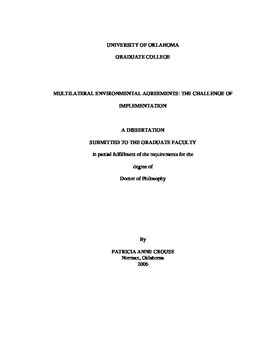| dc.contributor.advisor | Tao, Jill, | en_US |
| dc.contributor.author | Crouse, Patricia Anne. | en_US |
| dc.date.accessioned | 2013-08-16T12:20:21Z | |
| dc.date.available | 2013-08-16T12:20:21Z | |
| dc.date.issued | 2006 | en_US |
| dc.identifier.uri | https://hdl.handle.net/11244/1078 | |
| dc.description.abstract | This study looks at how Multilateral Environmental Agreements (MEAs) get implemented and once implemented, how they are monitored and achieve compliance. Implementation is looked at through the lens of historical institutionalism. Within this framework, the issues of sovereignty, collective action, capacity building, and resources are evaluated. This is done through the analysis of the National Reports submitted by the parties to the agreements and an original paper interview mailed out to the implementing agencies of the MEAs studied. | en_US |
| dc.description.abstract | Implementation theory has been a central focus of the policy process. How a policy gets implemented can take many forms. Implementation can take a top-down approach, a bottom-up approach, or an approach that combines the two. Most scholarship today looks at these various approaches from the perspective of a single, small-scale policy problem. | en_US |
| dc.format.extent | v, 140 leaves ; | en_US |
| dc.subject | Environmental law, International. | en_US |
| dc.subject | Political Science, General. | en_US |
| dc.subject | Environmental Sciences. | en_US |
| dc.title | Multilateral environmental agreements: The challenge of implementation. | en_US |
| dc.type | Thesis | en_US |
| dc.thesis.degree | Ph.D. | en_US |
| dc.thesis.degreeDiscipline | Department of Political Science | en_US |
| dc.note | Source: Dissertation Abstracts International, Volume: 67-06, Section: A, page: 2303. | en_US |
| dc.note | Adviser: Jill Tao. | en_US |
| ou.identifier | (UMI)AAI3222157 | en_US |
| ou.group | College of Arts and Sciences::Department of Political Science | |
